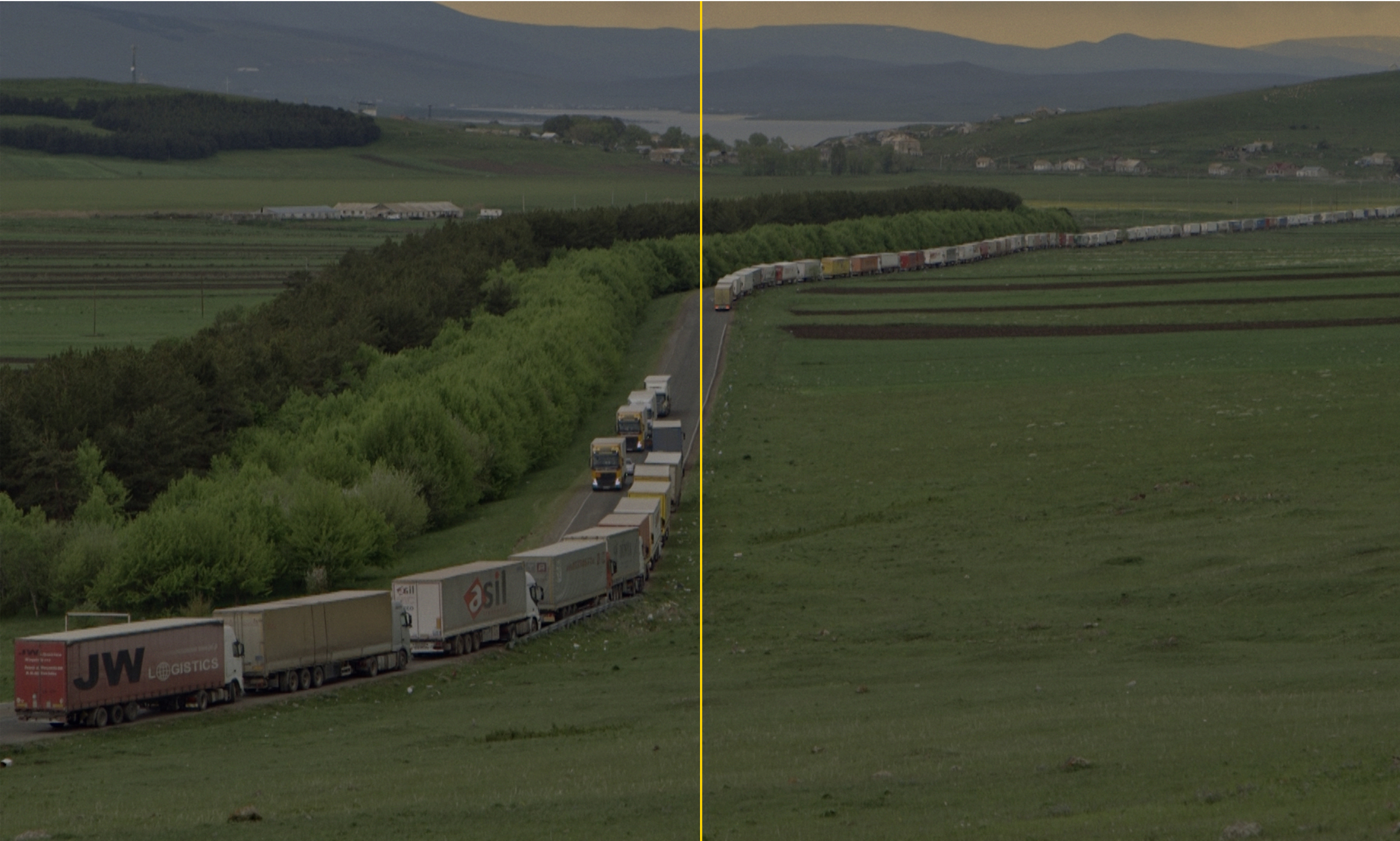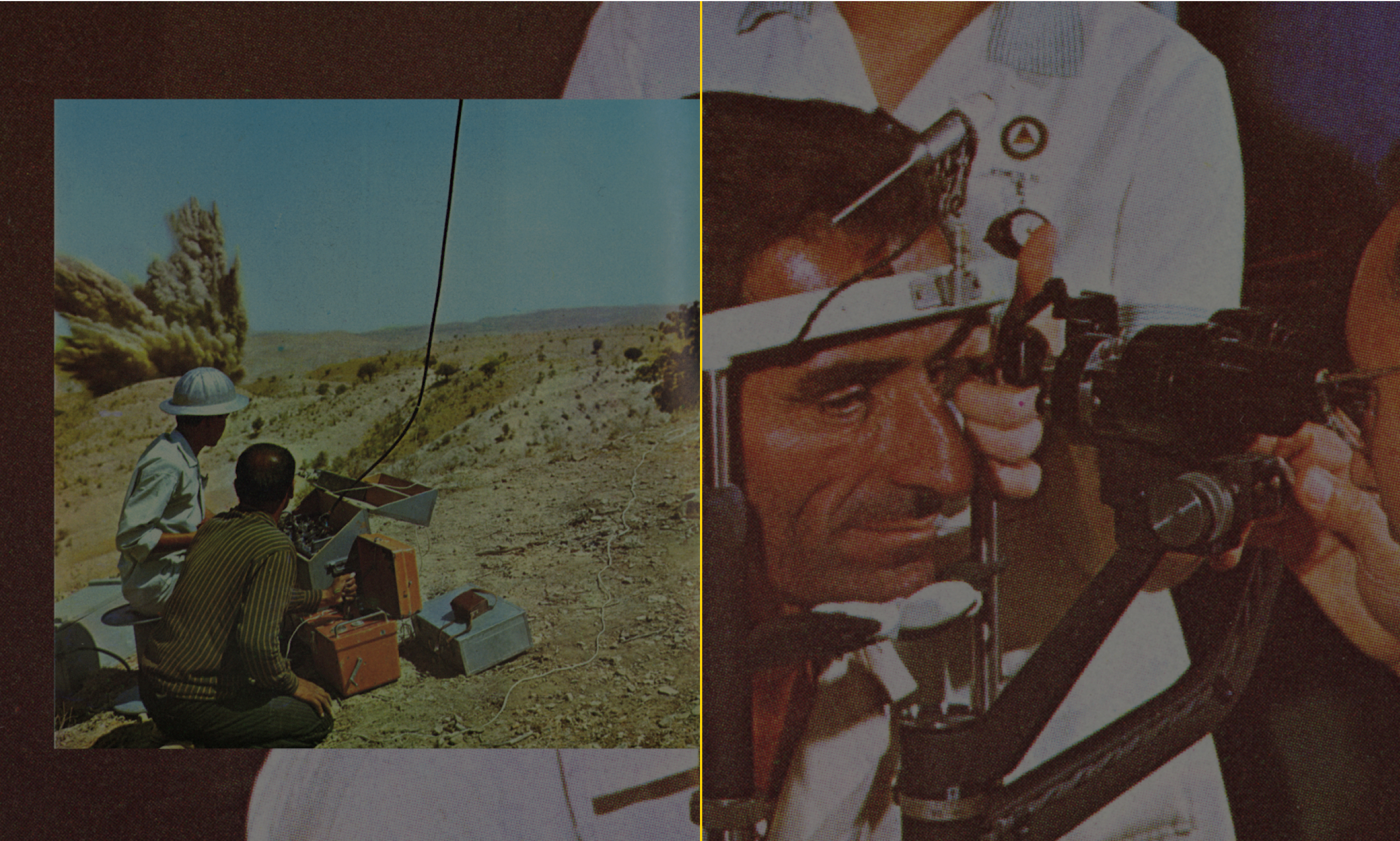Friday, October 18
︎ 18:00-20:40
︎ Coventry Transport Museum
A STATE IN A STATE by Tekla Aslanishvili (46 mins)
SCENES OF EXTRACTION by Sanaz Sohrabi (43 mins)
+ Q&A (60 mins)
+ pre-screnening food reception (17:00-18:00)
︎ Tickets
︎ 18:00-20:40
︎ Coventry Transport Museum
RAILROADS AND COLONIAL INFRASTRUCTURES IN SOUTH CAUCASUS AND IRAN
A STATE IN A STATE by Tekla Aslanishvili (46 mins)
SCENES OF EXTRACTION by Sanaz Sohrabi (43 mins)
+ Q&A (60 mins)
+ pre-screnening food reception (17:00-18:00)
︎ Tickets
Screening Rights Film Festival is bringing the latest socially engaged and formally innovative cinema from the Global South to audiences in the West Midlands. This year, we’re partnering with the Transport Museum in Coventry to stage a site-specific event that engages with the industrial heritage of the Midlands, as well as the British Petroleum archives at the University of Warwick. Titled RAILROADS AND COLONIAL INFRASTRUCTURES IN SOUTH CAUCASUS AND IRAN, it features Tekla Aslanishvili’s A State in a State alongside Sanaz Sohrabi’s Scenes of Extraction—two film essays that evoke detective investigations in the thoroughness of their research. In line with the 2024 festival’s theme, DOUBLE BILL, the screening tackles various geographical contexts that, on closer inspection, can be linked—in this case, British petrocolonialism in Iran and Soviet railroads in the South Caucasus.
A larger context for this screening is provided through an online programme, hosted by Screening Rights in collaboration with the Birmingham-based arts initiative Grand Union, titled ONE’S CONNECTION IS ANOTHER’S DIVISION: COLONIAL INFRASTRUCTURES IN SOUTH CAUCASUS AND PALESTINE, featuring Sebastia Disagreement by Yiru Qian and A Passage by Felix Kalmenson and Rouzbeh Akhbari.
A larger context for this screening is provided through an online programme, hosted by Screening Rights in collaboration with the Birmingham-based arts initiative Grand Union, titled ONE’S CONNECTION IS ANOTHER’S DIVISION: COLONIAL INFRASTRUCTURES IN SOUTH CAUCASUS AND PALESTINE, featuring Sebastia Disagreement by Yiru Qian and A Passage by Felix Kalmenson and Rouzbeh Akhbari.

A STATE IN A STATE
Tekla Aslanishvili / 2022 / Georgia / 47’ / Georgian, Russian, and English with English subtitles
In her symphonic, richly multilingual documentary, Georgian filmmaker Tekla Aslanishvili collects oral testimonies from railway workers, journalists, and researchers who worked on or around the railways that connect(ed) Georgia, Armenia, and Azerbaijan with Russia, Turkey, and Iran. Over time, these railway workers developed chains of solidarity that transcended the politics of the nation-states to which they belonged. Although many of the railways are classified and therefore prohibited from filming, they emerge as somewhat of a protagonist in the film—the titular semi-autonomous “state within a state,” historically an instrument of colonisation, now being used to turn the tables on the oppressors.
Tekla Aslanishvili is an artist, filmmaker and essayist whose works emerge at the intersection of infrastructural design, history and geopolitics.

SCENES OF EXTRACTION
Sanaz Sohrabi / 2023 / Canada/Iran / 43’ / English and Farsi with English subtitles
In the second part of her ongoing trilogy on British petrocolonialism in Iran—following the acclaimed One Image, Two Acts (2020)—Iranian filmmaker Sanaz Sohrabi delves deeper into the declassified photographic archives of British Petroleum to uncover haunting stories of labour exploitation, ecological devastation, and extractivism, focussing specifically on the role railroads played within the larger colonial infrastructures. The screening of this work is intended to engage with the industrial heritage of the Midlands, as well as the British Petroleum archives housed at the University of Warwick.
Sanaz Sohrabi is an artist, filmmaker and essayist whose work investigates the impermanence and malleability of historical records and narratives.
The screening will be accompanied by a panel discussion, featuring guest curator Milija Gluhovic, researcher Evelina Gambino, and filmmaker Yiru Qian (more guests TBA). The screening will be preceded by a food reception (17:00-18:00) by the freegan initiative The Real Junk Food Project Central.
ENGINES OF SOLIDARITY:
MILIJA GLUHOVIC INTERVIEWS EVELINA GAMBINO ON A STATE IN A STATE
One of the reasons we have highlighted the stories of infrastructure again is not to idealise a presumably idyllic time of infrastructural life, such as that during the Soviet Union, against the present. Instead, it is to emphasise that, in unfavourable circumstances, both past and present, there is always something excessive, something different. There are always ways in which people can express solidarity with each other, and they can, in fact, create different infrastructural worlds. If we pay attention to these infrastructural worlds and to the logics that govern them, then a better, more equitable vision of infrastructure could potentially emerge. Read the full intervew here︎
Evelina Gambino is the Margaret Tyler Research Fellow in Geography at Girton College, University of Cambridge. Her research is concerned with a situated analysis of global logistics. She has done ethnographic work around several flagship connectivity infrastructures in Georgia and the South Caucasus. In collaboration with artist and director Tekla Aslanishvili she has produced the experimental documentary A State in A State.
Milija Gluhovic is an Associate Professor of Theatre and Performance at the University of Warwick. His research interests include contemporary European theatre and performance, memory studies and psychoanalysis, discourses of European identity, migration and human rights, as well as religion, secularity, and politics.
MILIJA GLUHOVIC INTERVIEWS EVELINA GAMBINO ON A STATE IN A STATE
One of the reasons we have highlighted the stories of infrastructure again is not to idealise a presumably idyllic time of infrastructural life, such as that during the Soviet Union, against the present. Instead, it is to emphasise that, in unfavourable circumstances, both past and present, there is always something excessive, something different. There are always ways in which people can express solidarity with each other, and they can, in fact, create different infrastructural worlds. If we pay attention to these infrastructural worlds and to the logics that govern them, then a better, more equitable vision of infrastructure could potentially emerge. Read the full intervew here︎
Evelina Gambino is the Margaret Tyler Research Fellow in Geography at Girton College, University of Cambridge. Her research is concerned with a situated analysis of global logistics. She has done ethnographic work around several flagship connectivity infrastructures in Georgia and the South Caucasus. In collaboration with artist and director Tekla Aslanishvili she has produced the experimental documentary A State in A State.
Milija Gluhovic is an Associate Professor of Theatre and Performance at the University of Warwick. His research interests include contemporary European theatre and performance, memory studies and psychoanalysis, discourses of European identity, migration and human rights, as well as religion, secularity, and politics.
ON OIL WORKERS’ LABOUR MILITANCY:
AN EXCERPT FROM KATAYOUN SHAFIEE’S MACHINERIES OF OIL
Katayoun Shafiee is an Associate Professor in the History of the Middle East at the University of Warwick. She specialises in the history and material politics of large-scale infrastructures in the modern Middle East. Her first book, Machineries of Oil: An Infrastructural History of BP in Iran (MIT Press, 2018), integrates Middle Eastern history with interdisciplinary approaches in science and technology studies, reconfiguring the politics of the region through an examination of the British-controlled oil industry in Iran.
AN EXCERPT FROM KATAYOUN SHAFIEE’S MACHINERIES OF OIL
Oil’s unique physical and chemical properties demand that each category of work—drilling, pipeline construction, well maintenance, transportation, and refining—utilizes specific kinds of skilled and unskilled laborers such as drillers, pipeline fitters, engineers, geologists, and chemists. The layout and design of oil infrastructure, namely, that it has an enclave character and requires oil wells, a pipeline, and a refinery to transform the oil into marketable products, result in distinct methods of monitoring and surveillance of workers. The oil workers’ capacity to form unions and “engage in strike activity” is drastically reduced, especially when considering that other sources of oil can be relied on and tankers can be rerouted to replace a sudden loss of oil elsewhere. Thus, one reason oil companies have succeeded in making enormous profits has been “their ability to contain labor militancy.” Where labor militancy has occurred, it has generally been concentrated in refinery operations where there are large concentrations of skilled workers who occupy strategic positions to disrupt the economies of both oil-exporting and oil-consuming countries. Over time, pumping stations and pipelines replaced railways as the main means of transporting a liquid form of energy, rather than a solid, from the site of production to refineries and tankers for shipping abroad. This meant the infrastructure of oil operations was vulnerable but not as easy to incapacitate through strike actions as were railways that carried coal, for example. Read the full excerpt here︎
Katayoun Shafiee is an Associate Professor in the History of the Middle East at the University of Warwick. She specialises in the history and material politics of large-scale infrastructures in the modern Middle East. Her first book, Machineries of Oil: An Infrastructural History of BP in Iran (MIT Press, 2018), integrates Middle Eastern history with interdisciplinary approaches in science and technology studies, reconfiguring the politics of the region through an examination of the British-controlled oil industry in Iran.